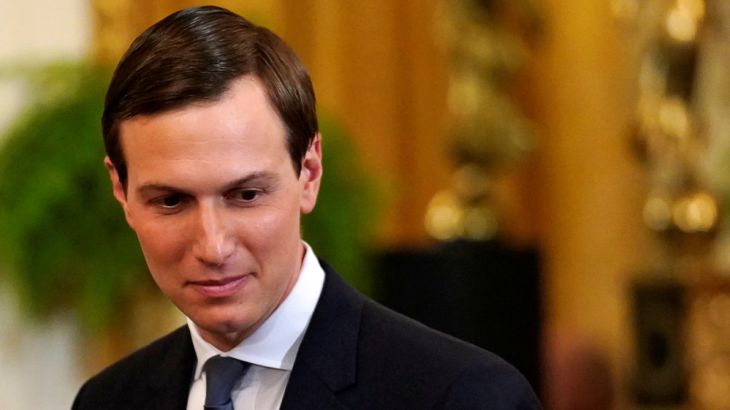
Jared Kushner on Israel-Palestine deal: Time to try something new
Senior adviser to the US president discusses Trump’s plan for economic growth and peace in the Middle East.
US President Donald Trump‘s “deal of the century” – his administration’s proposal for solving the Israeli-Palestinian conflict – kicked into gear in Manama, Bahrain this week as officials from the region gathered for the so-called “Peace to Prosperity” workshop.
Already, sceptics are voicing concern, saying the American side is using money to bribe the Palestinians.
Keep reading
list of 4 itemsIraq’s dangerous balancing act between Iran and the US
Russia-Ukraine war: List of key events, day 783
UN’s Libya envoy resigns citing no hope for political progress
The initial economic stage of the deal hopes to drum up $50bn in investment, money that primarily is expected to come from other Arab nations, principally in the Gulf. Participants of the Manama meeting will discuss projects and conditions for investments in more detail. Then, based on the outcome of this meeting, the next step would be to fashion a political settlement that would translate financial commitments into reality on the ground in Palestine.
However, Palestinians have derided the plan as an “economy first” approach that is doomed to fail. The Palestinian Authority (PA) is arguing for a reverse order: a political settlement first, money later – an approach that would tackle the difficult questions of establishing a Palestinian state, end the Israeli occupation of Palestinian lands, and allow refugees to return.
Palestinian leaders boycotted the June 25 and 26 workshop, saying the gathering circumvents a political settlement based on a two-state solution, and is an ill-fated attempt by the US administration to “liquidate” the Palestinian cause.
I think we all have to recognise that if there ever is a deal, it's not going to be along the lines of the Arab peace initiative. It will be somewhere between the Arab peace initiative and somewhere between the Israeli position.
However, the senior adviser to the US president and Trump’s son-in-law Jared Kushner – who has been tasked with leading the process – told Al Jazeera the reaction was “fairly predictable”. He said he believed the event would be a success despite the boycott, citing the presence of delegates from regional countries and a large number of international investors.
“What [the Palestinian leadership] have been saying is a lot of hot rhetoric about rejecting everything before they even see it, which is, in my opinion, not a very responsible position.”
When questioned about why the proposal did not want to settle some of the political questions that could stave off conflict before it pours money into infrastructure, Kushner said: “That’s been the traditional thinking, and that has not worked.”
“The president is not a traditional politician. He wants to do things in a different way. If we can get people through this process to look at this problem differently, to see what the future could be, then I think that could be a very very successful thing.”
Outlining the Trump administration’s “different” approach, he said: “What we have tried to do is help people identify what a future could look like. And hopefully we get people to all agree … and then we get people to look at, maybe, let’s commit to the future in the event that there is a peace agreement. Perhaps that will create a different condition through which people can then approach some of these political issues that have been unresolvable for a very long time.”
“It’s a problem that has been unsolved for many, many years and I think that a lot of the criticisms we get are from people who have tried to do this in the past and have failed and then they criticise us for not doing it the same way that they’ve done it,” he said.
Kushner called the 2002 Arab Peace Initiative “a great effort” but said it is not possible to solve the decades-long Israeli-Palestinian conflict with a deal along those lines.
“I think we all have to recognise that if there ever is a deal, it’s not going to be along the lines of the Arab peace initiative. It will be somewhere between the Arab peace initiative and somewhere between the Israeli position,” he said.
He also defended Trump’s 2017 decision to recognise Jerusalem as Israel’s capital, saying: “Israel is a sovereign nation; a sovereign nation has the right to determine where their capital is and America has the right to recognise the decision.” He said the relocation of the embassy should not affect final-status negotiations with the Palestinians.
Kushner said that on both the Israeli and Palestinian sides, there are voices who accuse the other of having no interest in peace. But he added that peace needs to come from compromise and negotiation.
“If we want to find a pathway forward, it means that both sides need to find a place where they both feel that they can gain more than they give, and move forward and have the opportunities to live better lives,” he said.